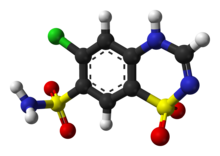Chlorothiazide, sold under the brand name Diuril among others, is an organic compound used as a diuretic and as an antihypertensive.[1][2]
 | |
 | |
| Clinical data | |
|---|---|
| Trade names | Diuril, others |
| Other names | 6-Chloro-2H-1,2,4-benzothiadiazine-7-sulfonamide-1,1-dioxide |
| AHFS/Drugs.com | Monograph |
| MedlinePlus | a682341 |
| Routes of administration | By mouth, IV |
| ATC code | |
| Legal status | |
| Legal status |
|
| Pharmacokinetic data | |
| Bioavailability | low |
| Metabolism | Nil |
| Elimination half-life | 45 to 120 minutes |
| Excretion | Renal |
| Identifiers | |
| |
| CAS Number | |
| PubChem CID | |
| IUPHAR/BPS | |
| DrugBank | |
| ChemSpider | |
| UNII | |
| KEGG | |
| ChEBI | |
| ChEMBL | |
| CompTox Dashboard (EPA) | |
| ECHA InfoCard | 100.000.368 |
| Chemical and physical data | |
| Formula | C7H6ClN3O4S2 |
| Molar mass | 295.71 g·mol−1 |
| 3D model (JSmol) | |
| Melting point | 342.5–343 °C (648.5–649.4 °F) |
| |
| |
| (verify) | |
It is used both within the hospital setting or for personal use to manage excess fluid associated with congestive heart failure. Most often taken in pill form, it is usually taken orally once or twice a day. In the ICU setting, chlorothiazide is given to diurese a patient in addition to furosemide (Lasix). Working in a separate mechanism from furosemide and absorbed enterically as a reconstituted suspension administered through a nasogastric tube (NG tube), the two drugs potentiate one another.
It was patented in 1956 and approved for medical use in 1958.[3] It is on the World Health Organization's List of Essential Medicines.[4]
Indications
edit- Large amount of excess fluid including:
Contraindications
editSide effects
editHistory
editThe research team of Merck Sharp and Dohme Research Laboratories of Beyer, Sprague, Baer, and Novello created a new series of medications, the thiazide diuretics, which includes chlorothiazide. They won an Albert Lasker Special Award in 1975 for this work.[6]
The structure has been determined by X-ray crystallography.[7]
See also
editReferences
edit- ^ Ernst ME, Grimm J, Richard H (November 2008). "Thiazide diuretics: 50 years and beyond". Current Hypertension Reviews. 4 (4): 256–65. doi:10.2174/157340208786241264.
- ^ Duarte JD, Cooper-DeHoff RM (June 2010). "Mechanisms for blood pressure lowering and metabolic effects of thiazide and thiazide-like diuretics". Expert Review of Cardiovascular Therapy. 8 (6): 793–802. doi:10.1586/erc.10.27. PMC 2904515. PMID 20528637.
- ^ Fischer J, Ganellin CR (2006). Analogue-based Drug Discovery. John Wiley & Sons. p. 456. ISBN 9783527607495.
- ^ World Health Organization (2021). World Health Organization model list of essential medicines: 22nd list (2021). Geneva: World Health Organization. hdl:10665/345533. WHO/MHP/HPS/EML/2021.02.
- ^ a b "Diuril (Chlorothiazide): Side Effects, Interactions, Warning, Dosage & Uses". RxList. Retrieved 2019-10-07.
- ^ "Historical Awards - The Lasker Foundation". The Lasker Foundation.
- ^ Johnston A, Bardin J, Johnston BF, Fernandes P, Kennedy AR, Price SL, Florence AJ (2011). "Experimental and Predicted Crystal Energy Landscapes of Chlorothiazide". Crystal Growth & Design. 11 (2): 405–413. doi:10.1021/cg1010049.